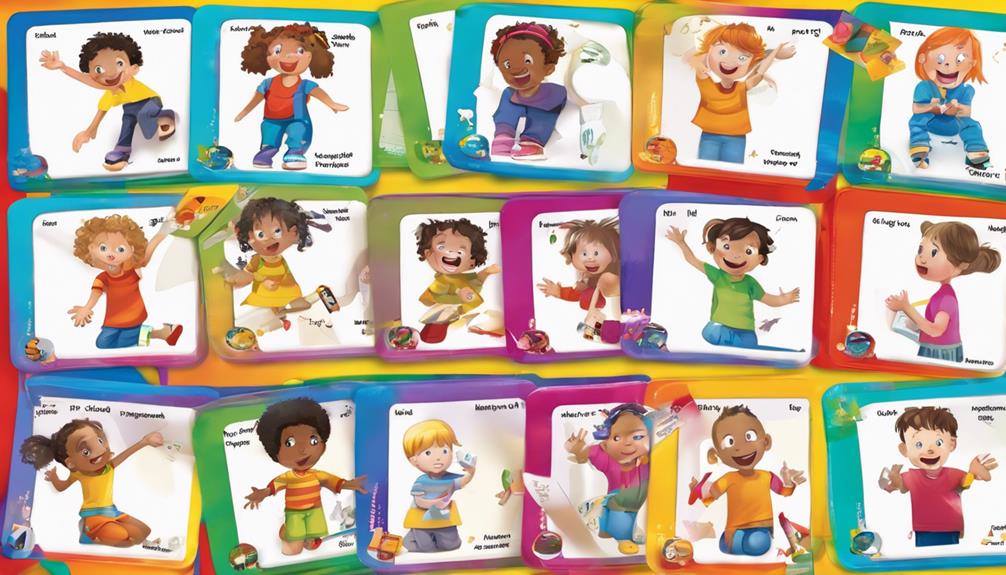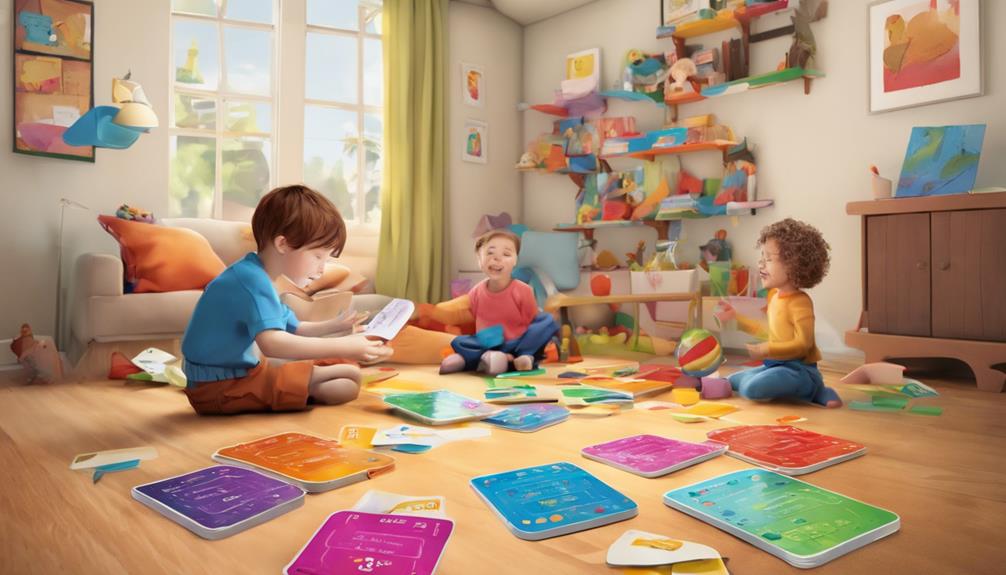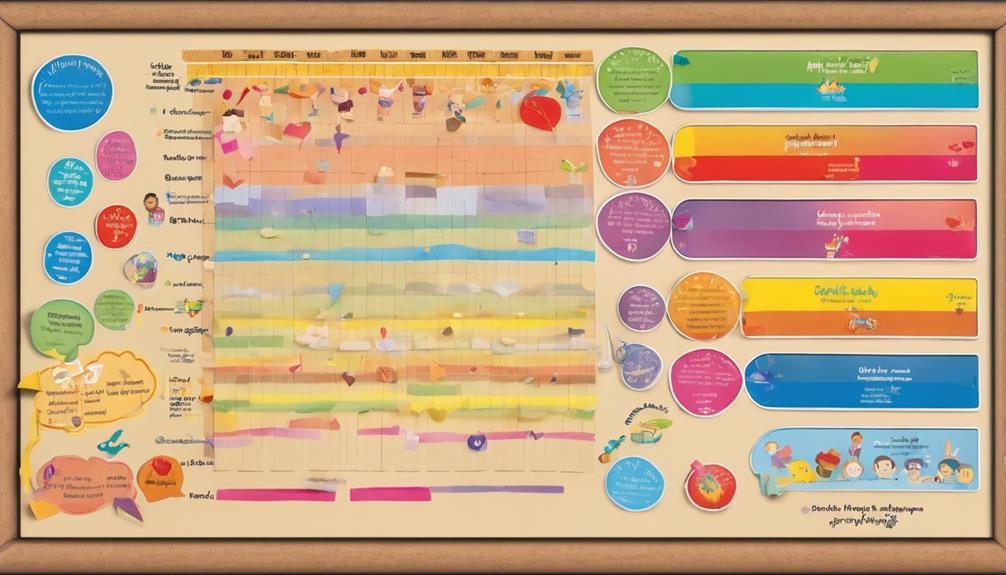As parents, we want to make sure our children are able to communicate effectively. Imagine having a handbook that guides you through speech therapy for your kids, offering helpful tips and support along the way.
From understanding the basics to implementing effective techniques, this guide is a game-changer for parents looking to make a significant impact on their child's speech development. So, how exactly can this resource transform your approach to supporting your child's communication journey?
Stay tuned to discover the strategies that could potentially revolutionize how you interact with your little one.
Key Takeaways
- Engage in home-based speech activities for better progress.
- Collaborate with therapists for effective home-based strategies.
- Monitor and track your child's speech therapy advancements.
- Implement tips for successful speech therapy outcomes.
Basics of Speech Therapy
In speech therapy, we focus on enhancing children's communication skills through tailored techniques and activities to help each child succeed. Our goal is to address speech and language disorders by improving articulation, language comprehension, and social interaction. By using play-based activities, exercises, and technology, we create engaging sessions that cater to the individual needs of each child.
Therapy plans are carefully customized based on a thorough evaluation, specific goals, and ongoing progress monitoring. We believe that parental involvement is crucial in supporting and reinforcing the outcomes of speech therapy at home. By working together as a team, we can ensure that the child receives consistent support and practice beyond the therapy sessions.
Through our dedication and expertise, we strive to create a nurturing environment where children can grow and develop their communication skills with confidence. Together, we can help your child succeed in their journey towards improved speech and language abilities.
Types of Speech Disorders

As we explore the types of speech disorders, it's important to understand the various challenges children may face.
Articulation disorders can make it difficult for kids to produce sounds accurately, while fluency disorders like stuttering disrupt the natural flow of speech.
Voice and language disorders also play a significant role in impacting a child's communication abilities.
Common Speech Issues
Addressing common speech issues involves understanding various types of speech disorders such as articulation disorders, phonological disorders, fluency disorders, and voice disorders.
Articulation disorders can impact a child's ability to pronounce sounds accurately, while phonological disorders affect the patterns of sound errors in speech.
Fluency disorders, like stuttering, can disrupt the natural flow of communication, causing frustration for children.
Voice disorders, on the other hand, involve difficulties with the pitch, volume, or quality of the voice, which can affect a child's confidence in expressing themselves.
Therapy Approaches
Therapists utilize various approaches to address different types of speech disorders, focusing on enhancing children's speech and language skills through tailored techniques and evidence-based practices. These approaches include articulation therapy, language intervention, fluency therapy, and voice therapy. By targeting specific areas such as sound production, language comprehension, social communication, and voice quality, therapists aim to support children's overall language development.
Tailored therapies for conditions like apraxia, phonological disorders, and articulation errors ensure individualized care. Evidence-based practices like play-based therapy, teletherapy, and parent training further enhance speech and language skills. Through personalized treatment plans based on evaluations and goals, therapists work towards addressing each child's unique speech therapy needs with precision and empathy.
Signs of Speech Delay
As parents, we understand the worry and concern that can arise when noticing signs of speech delay in our children.
It's important to recognize early on the limited vocabulary, difficulty forming sentences, and unclear speech that may indicate a delay.
Seeking timely intervention can make a significant difference in improving your child's communication skills and overall development.
Early Identification Is Key
Recognizing the signs of speech delay early on is crucial for providing effective intervention and support for children. When it comes to identifying potential speech delays in kids, there are key things to look out for:
- Limited vocabulary
- Difficulty forming sentences
- Unclear speech
These signs can sometimes be subtle, but monitoring your child's developmental milestones and trusting your parental instincts are essential in catching speech delays early.
Seeking a professional evaluation as soon as you have concerns can make a significant difference in the outcomes for children facing speech delays. Remember, early intervention is key to helping children overcome speech challenges and reach their full potential.
Importance of Intervention Early
Monitoring your child's speech development closely and seeking professional evaluation when concerned can significantly impact their progress and potential success in overcoming speech delays. Early intervention is critical as it leads to the best outcomes for children with speech delays.
By addressing a child's speech therapy needs promptly, parents can help prevent further delays in their development. Trusting your instincts and recognizing red flags in your child's speech can guide you to seek the necessary support.
Importance of Early Intervention

Early intervention in speech therapy is crucial for children with communication disorders to achieve better outcomes and improve their language skills. Research indicates that starting speech therapy early can significantly benefit children with speech delays. Here are three key reasons highlighting the importance of early intervention:
- Faster Progress: Children who receive early intervention in speech therapy have shown faster progress in catching up to their peers.
- Improved Language Skills: Early identification and treatment of speech issues can lead to improved language skills in children.
- Prevention of Challenges: Addressing speech concerns early can help prevent academic and social challenges that may arise later on.
As parents, recognizing and addressing speech concerns early on is vital in supporting your child's development. By seeking early intervention for speech delays, you can provide your child with the necessary tools to communicate effectively and thrive in various aspects of life.
Speech Therapy Techniques

To further enhance children's communication skills, speech therapy techniques encompass a range of strategies tailored to address specific speech challenges and promote overall development. These techniques, designed to benefit the child, may include articulation exercises focusing on improving speech sound errors, language activities to address language delays, and social communication practice to enhance interpersonal skills. Speech therapists customize these techniques to meet the child's individual needs and goals for speech development, ensuring a personalized approach to therapy.
Incorporating play-based activities and real-life scenarios into therapy sessions not only makes the process more engaging for the child but also enhances the effectiveness of the techniques used. By creating a supportive and interactive environment, therapists can encourage children to practice their communication skills in a natural and enjoyable way, leading to more significant progress and improved confidence in their ability to communicate effectively.
Creating a Supportive Environment

Creating a supportive environment for speech therapy sessions is essential for maximizing the effectiveness of the techniques used and promoting children's communication skills development. To ensure a positive atmosphere, consider the following:
- Encouragement: Providing positive reinforcement and praise can help motivate children during therapy sessions and enhance their confidence.
- Quiet Space: Establish a quiet and distraction-free area at home for therapy sessions. This can improve focus and create an environment conducive to learning.
- Visual Aids: Incorporating visual aids like pictures or charts can reinforce speech therapy concepts and encourage active participation.
Speech Therapy Activities at Home

Engaging in speech therapy activities at home is a valuable way to support children's speech and language development. These home-based activities play a crucial role in enhancing communication skills and boosting confidence in children. By incorporating speech therapy exercises into daily routines, parents can help their child achieve specific speech goals outlined in their therapy plan. Consistent practice of these activities reinforces the lessons learned during therapy sessions, leading to more effective progress.
Implementing home-based speech therapy strategies can be a collaborative effort between parents and speech therapists. Parents can work closely with therapists to understand the best techniques to use at home and ensure that the activities are aligned with the child's individual needs. By creating a supportive environment and dedicating time each day to speech therapy exercises, parents can contribute significantly to their child's speech development journey. Through these efforts, children can improve their speech and language skills in a familiar and comfortable setting, setting them up for success in their overall communication abilities.
Tracking Your Child's Progress

Monitoring your child's progress in speech therapy involves observing their speech and language development over time. It's essential to keep track of how your child is advancing to ensure they're reaching their speech goals effectively. Here are three key points to help you in tracking your child's progress:
- Speech Sounds: Pay close attention to the clarity and accuracy of the speech sounds your child produces during therapy sessions. Note any improvements or difficulties they may be experiencing with specific sounds.
- Language Development: Monitor how your child is expanding their vocabulary and using language in different contexts. Document any new words they learn or how they're forming sentences.
- Therapist Feedback: Regularly communicate with your child's speech-language pathologist to understand their professional assessment of your child's progress. Their insights can guide you on areas needing more attention or adjustments in therapy approaches.
Tips for Success in Speech Therapy

To maximize the effectiveness of speech therapy for children, consistent practice routines at home play a crucial role in reinforcing the lessons learned during therapy sessions. It is essential to create a supportive environment that encourages communication and language development. Positive reinforcement and praise are powerful motivators during speech therapy sessions, helping children stay engaged and motivated. Collaborating closely with the speech therapist allows for tracking progress and adjusting strategies as needed. Additionally, utilizing recommended tools and resources provided by the speech therapist can significantly enhance learning outcomes. By incorporating these tips into your child's speech and language therapy journey, you can set them up for success and empower them to reach their full potential.
| Tips for Success in Speech Therapy | |
|---|---|
| Implement consistent practice routines at home | Encourage positive reinforcement and praise |
| Collaborate closely with the speech therapist | Create a supportive environment at home |
| Utilize recommended tools and resources | Track progress and adjust strategies accordingly |
Frequently Asked Questions
How Can I Teach My Child Speech Therapy at Home?
We can teach our child speech therapy at home by incorporating speech sounds, vocabulary, and language skills into everyday activities like playtime, mealtime, and bedtime routines.
Using visual aids, books, and games designed for speech therapy can make learning enjoyable.
Consistency and repetition are crucial for reinforcing concepts and promoting progress.
Seeking guidance from a speech-language pathologist for personalized strategies and support can further enhance our efforts.
How Do You Tell a Parent a Child Needs Speech Therapy?
We approach parents with empathy and understanding when discussing the need for speech therapy for their child. We provide clear examples of speech challenges to support the therapy recommendation, emphasizing the positive impact of early intervention.
Offering resources and support, we collaborate with parents to set realistic goals. Early identification and therapy can greatly benefit the child's development and future communication skills.
At What Age Should a Child Start Speech Therapy?
We believe children should start speech therapy as early as 18 months if they show speech or language delays.
Early intervention is crucial for maximizing therapy effectiveness. It can benefit kids struggling with articulation, comprehension, or social skills.
The appropriate age for therapy depends on the child's needs and the severity of their issues. Consulting with a speech-language pathologist can help determine the best time to start therapy for a child.
How Do I Prepare My Child for Speech Therapy?
We can prepare our child for speech therapy by discussing the process positively, addressing any concerns openly, and highlighting the benefits of improved communication.
Involving our child in selecting engaging activities for sessions and establishing a routine can help them feel more comfortable and prepared.
Open communication and a supportive approach will go a long way in making the experience a positive one for our child.
Conclusion
As parents, we hold the key to unlocking our children's potential through speech therapy. By creating a nurturing environment and actively engaging in speech therapy activities at home, we can help our kids blossom into confident communicators.
Remember, Rome wasn't built in a day, and neither is progress in speech therapy. So, let's keep our eyes on the prize and continue to water the seeds of communication skills in our little ones.
Together, we can move mountains!










